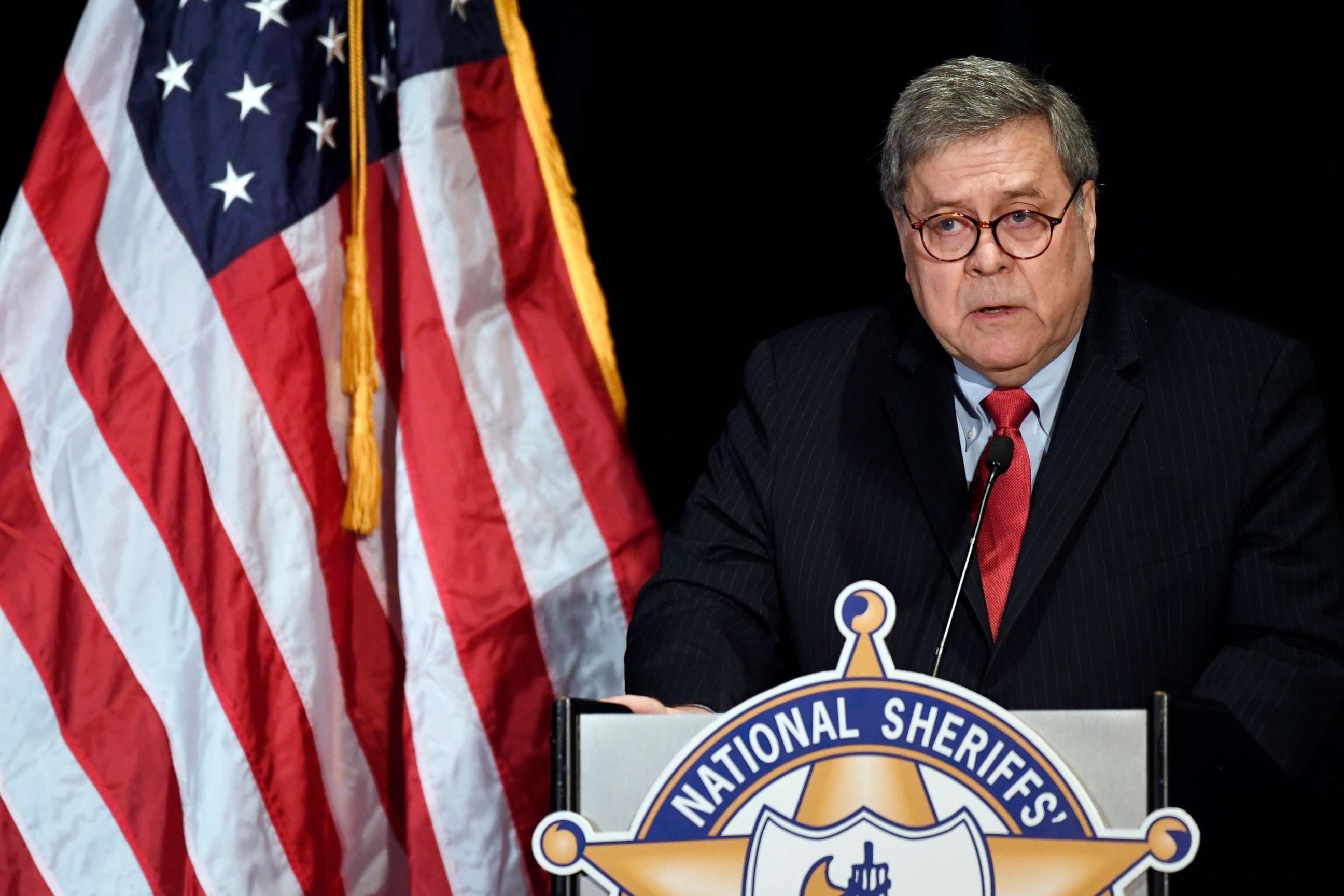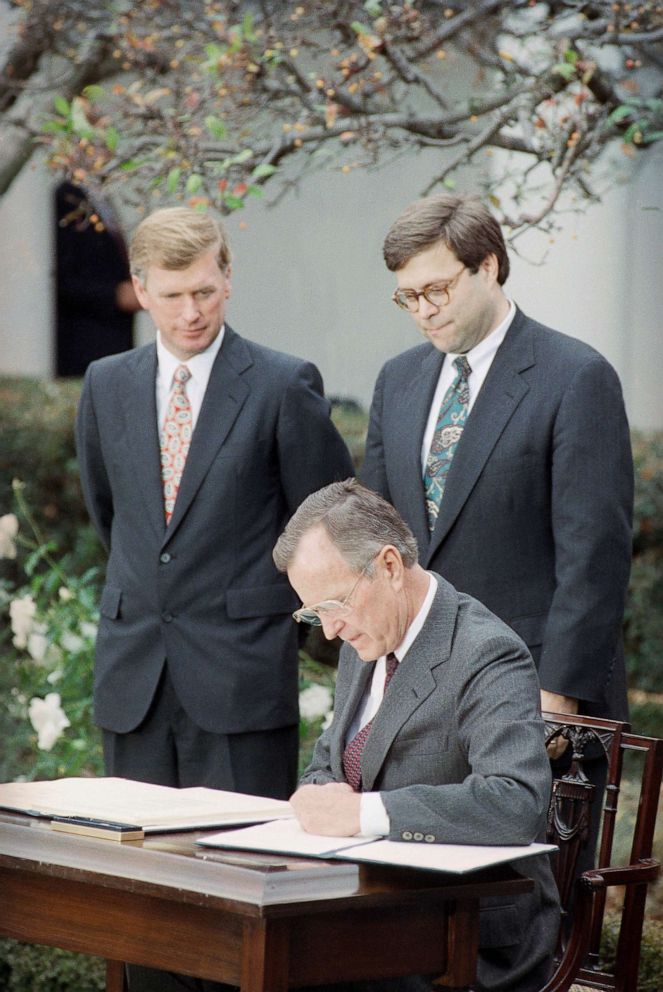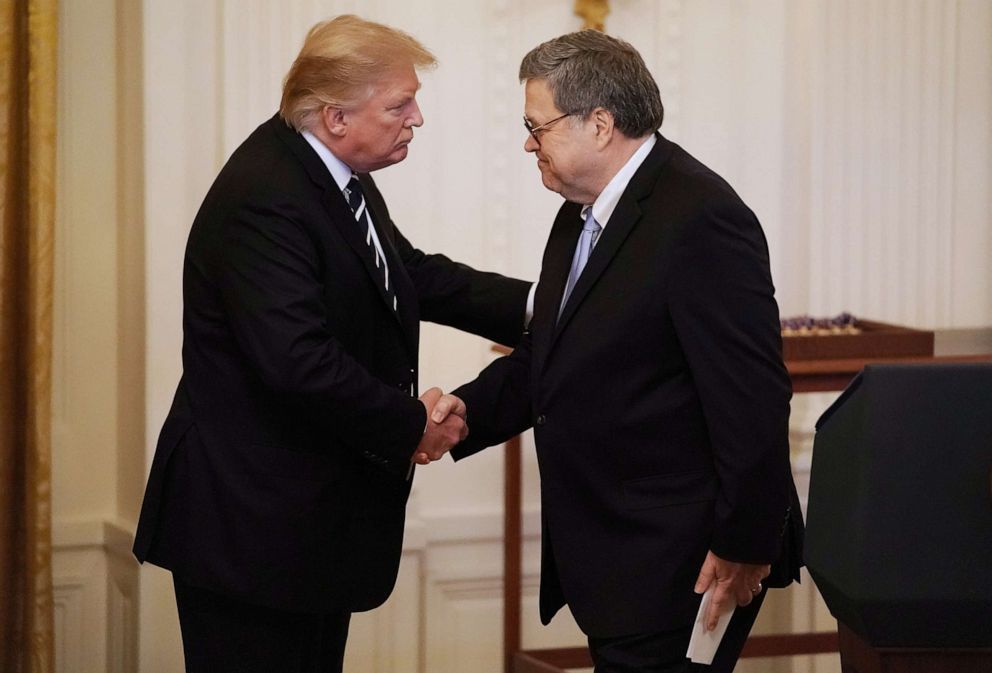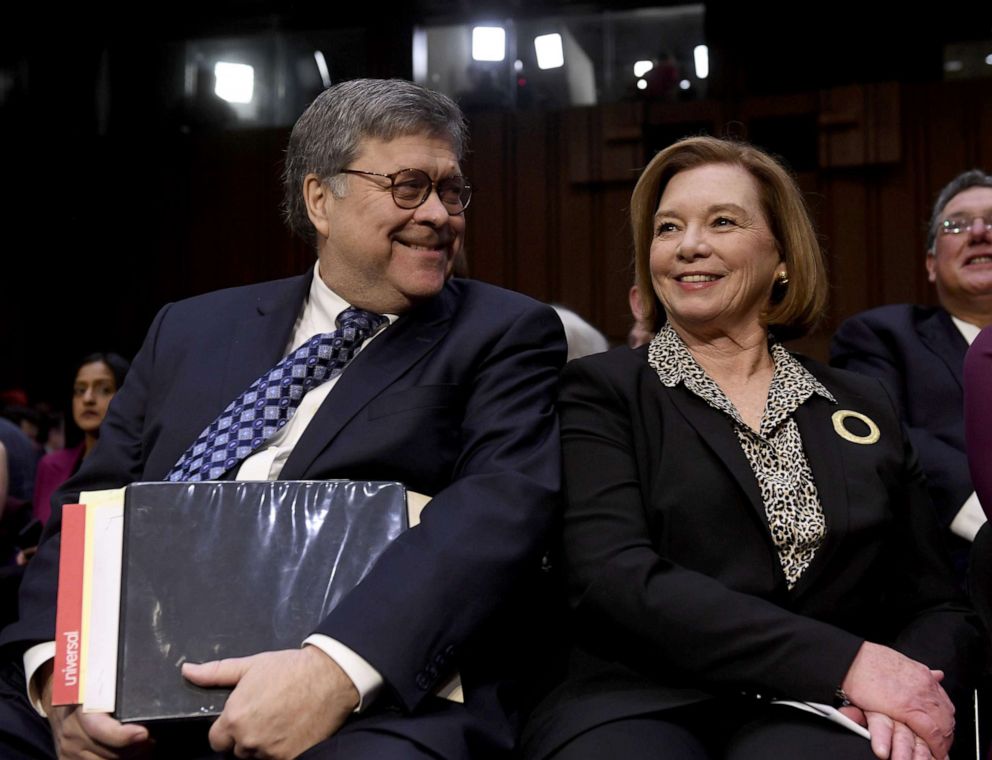William Barr: Everything you need to know about Trump's controversial attorney general
Barr previously served as attorney general under President George H.W. Bush.
Ever since William Barr was sworn in as President Donald Trump's attorney general, he's found himself at the center of some of Washington's biggest political controversies.
This week, Trump congratulated Barr for "taking charge" in the case of the president's longtime friend and former campaign adviser Roger Stone after the Justice Department leadership overruled the sentencing recommendation made by career prosecutors, proposing more lenient prison time. Democrats accused Trump of blatant political interference to help his friend and Barr of abusing his power to help Trump politically. In an unprecedented turn of events, the entire team of four federal prosecutors involved in Stone's case withdrew, apparently in protest.

Barr is scheduled to testify before the House Judiciary Committee on March 31, giving Democrats the chance to question him not only about the reversal of Stone's sentencing recommendation, but also about other matters that have emerged in the aftermath of Trump's impeachment. They include his willingness to have the Justice Department accept and vet information about and from Ukraine provided by the president's personal attorney, Rudy Giuliani. Without providing evidence, Giuliani has accused former Vice President Joe Biden and his son, Hunter, of criminal corruption.
Since Barr's first tenure as attorney general in President George H. W. Bush's administration in the early 1990s, he has been a strong proponent of presidential power over the executive branch, including the Justice Department.

Here’s everything you need to know about Barr:
Name: William Pelham Barr
Date of birth: May 23, 1950
Age: 69
Hometown: New York, NY
Family: Barr is one of four children. His father, Donald, taught at Columbia University before becoming the headmaster of the Dalton School. His mother, Mary, was a Yale graduate and taught at Columbia as well. He's been married to his wife, Christine, for more than forty years. The couple has three daughters together.
Before Barr joined the Trump administration, his oldest daughter, Mary Daly, worked in the Justice Department as the director of opioid enforcement and prevention, but she left her role for the Treasury Department's financial crimes unit as her father was confirmed. Daly's husband currently works in the Justice Department's national security division, and Barr's other son-in-law, Tyler McGaughey, serves as an attorney in the White House counsel's office.
Education: Barr received a Bachelor of Arts in government from Columbia University in 1971 and a Master of Arts in government and Chinese studies also from Columbia in 1973. In 1977, he graduated law school from George Washington University with highest honors.
What he used to do: While attending graduate school and law school, Barr worked for the Central Intelligence Agency. After graduating from law school, he clerked for the U.S. Court of Appeals for the D.C. Circuit Court, joined a private firm, and then served as deputy assistant director for legal policy in the Reagan White House for a little over a year.
After working in the Department of Justice’s office of legal counsel and then as deputy attorney general under President George H.W. Bush, Barr was nominated to become the next attorney general. He received unanimous approval in a Senate voice vote at his confirmation process in November 1991 and served until the end of Bush’s presidency in 1993.
In 1992, Barr wrote a report, "The Case for More Incarceration" in which he argued for an increase in the U.S. incarceration rate and number of prisons and for the end of parole release. Also while serving as attorney general under Bush, Barr also led the Department’s response to the Savings & Loan crisis, oversaw the investigation of the Pan Am 103 bombing, and coordinated counter-terrorism activities during the First Gulf War, according to his official biography.
Upon leaving the Bush administration, Barr took a 15-year break from federal service. For 14 years he worked for the telecommunications company GTE Corporation and helped lead its merger with Bell Atlantic to become Verizon Communications. He retired from Verizon in 2008 as a multi-millionaire.
Before taking over the helm of Trump's Justice Department in February 2019, Barr worked as an attorney for Kirkland and Ellis LLP, a high-profile law firm Washington, D.C., and served on the board of directors of Time Warner.
Key career moments: Before Barr was nominated as Trump's attorney general, in a May 2017 op-ed in The Washington Post, he argued Trump made the right call in firing FBI director James Comey.
Nearly a year later, in June 2018, Barr submitted a memo to the Department of Justice as a private citizen further criticizing Mueller's probe and defending Trump's dismissal of Comey.

Barr assumed his position in President Trump's administration on Feb. 14, 2019, when the Senate confirmed him by a 54-45 near party-line vote. He replaced acting Attorney General Matthew Whitaker, who held the top post since Trump fired his first attorney general, Jeff Sessions, in November 2018. Trump has said that Barr was his "first choice from day one."
At Barr's confirmation hearing last year, he expressed support for the border wall and a federal law banning anti-LGBT discrimination, argued against sanctuary cities and immigrants "abusing the asylum system," and echoed Trump's mistrust of the press. Despite the rhetoric in his earlier memo, Barr also argued that Mueller's probe into Russian interference in the 2016 election must proceed.
"I will not permit partisan politics, personal interests, or any other improper consideration to interfere with this or any other investigation," Barr said in his opening remarks, adding that his goal "will be to provide as much transparency as I can consistent with the law."
However, when Mueller submitted his report to the Justice Department in March 2019, Barr stopped short of promising to release it in full -- and he's faced staunch criticism from Democrats ever since.
Two days after Barr received Mueller's report, Barr sent a four-page summary to Congress, saying: "The investigation did not establish that members of the Trump campaign conspired or coordinated with the Russian government in its election interference activities." On the question of obstruction of justice, Barr wrote that while Mueller's report "does not conclude that the President committed a crime, it also does not exonerate him."

Barr released a redacted version of the Mueller report a month later. Almost immediately Mueller raised objections to Barr’s characterization of the Russia investigation and its findings, saying Barr's four-page summary failed to "fully capture" the findings, prompting Democrats to heighten their criticisms of the attorney general.
Barr has shown more disdain for the Russia probe -- and other investigations into the President -- as time has passed. In December 2019, for example, Barr described the Russia investigation as a "travesty," and lambasted former FBI officials involved in opening it, claiming "the greatest danger to our free system" is that the Obama administration "spied" on the Trump campaign in a way that he said sought to influence the 2016 election. ABC News did not find evidence to substantiate those claims.
Barr was also infamously mentioned on the July 25 phone call between Trump and Ukraine's president, Volodymyr Zelenskiy, in the same sentence as was Trump's personal lawyer, Rudy Giuliani, who played a key role the Ukraine affair that prompted the president's impeachment.
"I will have Mr. Giuliani give you a call and I am also going to have Attorney General Barr call," Trump told Zelenskiy, according to notes released by the White House.
In testimony before the House Intelligence Committee in the following months, the then-top American diplomat in Ukraine, Bill Taylor, said, he had discussed the possibility that Ukraine’s prosecutor would make a public statement about “investigations, potentially in coordination with Attorney General Barr’s probe.”
Democrats have accused Barr of using the power of the Justice Department -- what is supposed to be the nation's highest, independent, law-enforcement body -- to help President Trump politically.
What you might not know: Barr is a musician. He began playing the bagpipes as a child and has occasionally played at Justice Department functions.
In his first stint as attorney general under President George H. W. Bush, Barr oversaw Robert Mueller, who was then in charge of the Justice Department's criminal division.
Barr and John Crittenden (1841 and 1850-1853) are the only two people in American history to serve twice as attorney general.
ABC News' Alexander Mallin and Luke Barr contributed to this report.




